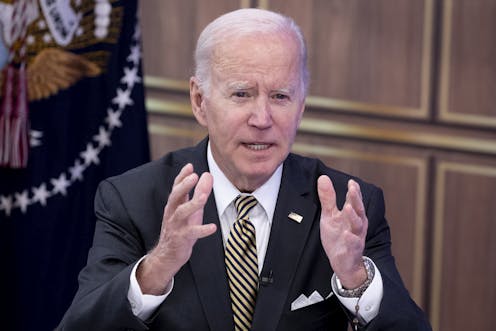Republicans gain in US midterm polls with three weeks until election
- Written by Adrian Beaumont, Election Analyst (Psephologist) at The Conversation; and Honorary Associate, School of Mathematics and Statistics, The University of Melbourne

The United States midterm elections will be held in nearly three weeks, on November 8. All 435 House of Representatives seats are up for election, as well as 35 of the 100 senators. Democrats won the House by 222-213 in 2020, and hold the Senate on a 50-50 tie with Vice President Kamala Harris’s casting vote.
The FiveThirtyEight forecasts currently give Democrats a 61% chance to hold the Senate, but Republicans have a 75% chance to gain control of the House. There’s a 38% chance for Republicans to win both chambers, a 37% chance of Democrats holding the Senate while losing the House, and a 24% chance for Democrats to win both chambers.
Since my last article on the US midterms three weeks ago, Democratic chances of holding the Senate have dropped from 68% to 61%, and Republican chances of gaining the House have increased from 69% to 75%. Democratic chances in the Senate peaked at 71% on September 20.
In the national House popular vote, Democrats’ lead over Republicans has been cut to just a 45.3-45.0 margin in the FiveThirtyEight aggregate; that 0.3% lead has dropped from 1.3% three weeks ago. President Joe Biden’s ratings have also declined since my last article; he’s currently at 53.2% disapprove, 42.3% approve (net -10.9); his net approval was -10.2 three weeks ago.
Of the 35 senators up for election, 21 are Republicans and 14 Democrats. Democrats will probably gain Pennsylvania, where they lead by five points in the FiveThirtyEight averages. To win the Senate, Republicans would then need to gain Nevada, where they lead by one point, and Georgia, where Democrats lead by four.
In every midterm election since 2006, the non-presidential party has easily won the House. But when the US Supreme Court struck down the constitutional right to an abortion in late June, Democrats were galvanised, and they performed well in four federal August byelections, gaining the Alaska at-large seat.
However, Democrats may have peaked too early. The economic data on inflation is still poor, and there are worries over whether the interest rate rises needed to control inflation will push the US into a recession.
Economic concerns are becoming more important to voters, and this probably explains the Republicans’ recent gains. With nearly three weeks to go, these concerns may lead to further Republican gains.
At the last two presidential elections in 2016 and 2020, polls overstated Democrats. But Donald Trump’s name won’t appear on the ballot paper this year, and polls at the last midterm elections in 2018 were accurate. FiveThirtyEight analyst Nate Silver said on September 16 that the polls at these midterm elections could be wrong in either direction.
If the polls are understating Republicans again, election night will be ugly for Democrats and Biden.
Read more: The United States is gearing up for midterm elections. What are they and what's at stake?
Economic data: jobs and inflation
The US September jobs report was released on October 7. There were 263,000 jobs created, and the unemployment rate dropped 0.2% to 3.5%, reversing a 0.2% increase in August. However, the unemployment drop occurred mostly due to a 0.1% drop in participation. The employment population ratio – the share of eligible Americans employed – was unchanged at 60.1%.
Both the employment population ratio and participation rate are 1.1% below their levels before the COVID pandemic began in February 2020. The October jobs report will be released November 4, four days before the election.
The September inflation report was released October 13, and will be the last inflation report before the election. Headline inflation was up 0.4% after a 0.1% increase in August, but inflation excluding food and energy (“core” inflation) was up 0.6%, the same increase as in August.
Since June’s 1.3% increase in headline inflation, this measure has only increased 0.5% in the last three months. But this is due to a fall in energy prices, and central banks are far more concerned about core inflation when setting interest rates.
Real (inflation-adjusted) earnings dropped 0.1% in September after a 0.2% gain in August. In the 12 months to September, real earnings were down 3.0% in hourly pay and 3.8% in weekly pay.
UK polling after Liz Truss sacked Kwasi Kwarteng
Three weeks after the September 23 United Kingdom “horror” budget, Prime Minister Liz Truss sacked Chancellor Kwasi Kwarteng on October 14. She also announced a U-turn on budget proposals to not proceed with a corporations tax hike from 19% to 25% next April.
New Chancellor Jeremy Hunt announced on Monday the government would abandon the September 23 budget.
A UK national Redfield & Wilton poll taken Sunday gave Labour its biggest lead in any recent poll, a 36-point lead (56% to 20% over the Conservatives). Truss’ net approval was at a dire -61, with 70% disapproving and just 9% approving.
Update Friday: Overnight AEDT, Liz Truss resigned as PM. The next Conservative leader and PM will be decided by a fast-tracked process. Candidates will need at least 100 Conservative MP nominations by Monday. As there are 356 Conservative MPs in the House of Commons, at most three candidates can reach the required nominations.
If only one candidate reaches the 100 nominations, that candidate is elected Conservative leader and PM. If three candidates reach the threshold, there will be a vote of Conservative MPs on Monday to winnow them down to two.
The final two candidates will go to the Conservative membership, which will vote by online methods. This vote will close next Friday October 28, with the result to be declared soon after.
Authors: Adrian Beaumont, Election Analyst (Psephologist) at The Conversation; and Honorary Associate, School of Mathematics and Statistics, The University of Melbourne





